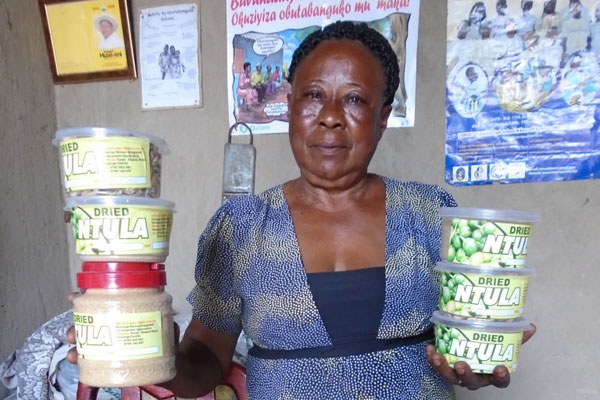Magezi mints cash from adding value to ntula

Ms Robbinah Magezi displays some of the product ready for sale. PHOTO/FRED MUZAALE
What you need to know:
Ms Magezi says they have so far trained women in value addition to vegetables to women groups from Nakaseke and Masaka districts.
Uganda is endowed with a number of traditional vegetables, which are consumed in fresh form.
Among the major vegetables consumed in Uganda are garden eggs, cabbages, bitter berries, okra, French beans, Nakati, cowpeas and many others.
Vegetables are a major source of vitamins. Because many farmers lack the technical knowhow of adding value to vegetables, most of them sell them in fresh form. As farmers hurry to sell off their vegetables before they dry, especially during on-season periods, the buyers or consumers pay them little, making them earn little from their sweat.
Value addition
However, to overcome this challenge, a group of women, under Kayunga Women Integrated Development Association in Kaazi Village, Kayunga Sub-county in Kayunga District, have embarked on adding value to garden eggs locally known as ntula.
Led by Ms Robinah Magezi as its chairperson, the group has a membership of 20 women, all garden egg farmers. Ms Magezi is also a member of the Buganda lukiiko (parliament).
The women produce dried and powdered garden eggs, which they package and sell. She says although they own garden egg gardens, they sometimes buy from other farmers at Shs9,000 a basin. “Before we started adding value to garden eggs, we were almost giving away our produce to buyers free of charge. But currently, we are earning much more from our vegetables,” Ms Magezi says.
The process
Ms Magezi says the process begins with harvesting mature garden eggs. The garden eggs are then washed with clean water for at least three times to ensure cleanliness.
They are then sliced into pieces using a slicing machine. The slices are placed on a clean tray and then dried under a shed, which makes them not lose all the nutrients. This takes about three days.
For the case of making powdered ntula, the dry vegetables are pounded into powder form using a mortar and pestle. She explains that they don’t use machines to mill the ntula in order to make them healthy to consume.
The powdered or dried vegetables are packaged in plastic containers of 1,000 grams and 600 grams. The product is sold under the trade name, Dried Ntula.
Customers
Ms Magezi says they sell most of their product to Community Women Enterprise Network (CWEN) located in Ntinda, Kampala. On top of buying their produce, CWEN provides them with post-harvest handling techniques of vegetables and has also provided them with a small vegetable milling machine. She says CWEN pays them cash on delivery.
However, Ms Magezi says they also sell to supermarkets and shops in Kampala, Jinja, Mukono and others, including individual buyers. She adds that they are also exploring avenues of getting foreign markets. A 1,000 gram pack of powdered ntula goes for Shs10,000, while that of 500 grammes goes for Shs5,000. In a week, they earn about Shs500,000.
Challenges
Among the challenges they face, Ms Magezi says it is lack of enough capital to be able to buy a lot of garden eggs so that they can meet the market demand. Also, the negative attitude of buyers within the country about agricultural produce made from the rural areas is having a negative effect on their sales. “Some people think such produce is not good for consumption well as it is not true,” Ms Magezi says.
How to grow garden eggs
From nursery bed, a farmer is advised to dig one centimetre deep holes and sow seeds in rows of 15 and 20 centimetres apart. After sowing, cover the seeds with a thin layer of soil followed by watering. However, it should be regularly to avoid drying.
They do well in well drained sandy loam, loam or clay loam soils. Garden eggs usually start to bear about two months after transplanting and may continue to bear for three months or more months.




